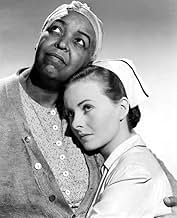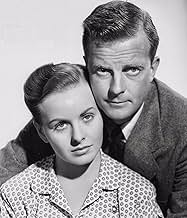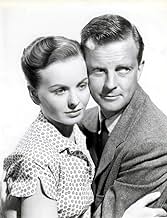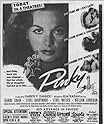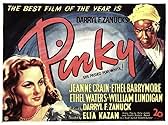CALIFICACIÓN DE IMDb
7.2/10
3.6 k
TU CALIFICACIÓN
Una enfermera negra de piel clara regresa a su pueblo y debe cuidar a una anciana maestra muribunda.Una enfermera negra de piel clara regresa a su pueblo y debe cuidar a una anciana maestra muribunda.Una enfermera negra de piel clara regresa a su pueblo y debe cuidar a una anciana maestra muribunda.
- Dirección
- Guionistas
- Elenco
- Nominado a 3 premios Óscar
- 3 premios ganados y 4 nominaciones en total
Fred Aldrich
- Townsman
- (sin créditos)
Shelby Bacon
- Boy
- (sin créditos)
Betty Beard
- Minor Role
- (sin créditos)
Rene Beard
- Teejore
- (sin créditos)
Arthur Berkeley
- Townsman
- (sin créditos)
Patsy Boniface
- Minor Role
- (sin créditos)
Mildred Boyd
- Nurse
- (sin créditos)
Opiniones destacadas
I've never wanted to watch "Pinky" because of my own prejudices.
Jeanne Crain? Beautiful but mediocre actress. (The weak link, so I thought, in "A Letter to Three Wives.") A film about racial predicaments circa 1949, falling between "Imitation of Life" (Claudette Colbert, 1934) and Lana Turner's (1959) and Douglas Sirk's classic glossy tearjerker of the same title? Who cares about "Pinky?"
Turns out (now that I've seen it), like most prejudices, I was wrong about everything.
It's all in the story and the script, as usual.
"Pinky" bypasses every sudsy cliché of "Imitation of Life" in either incarnation and proceeds directly to the heart of characters far more real, and a story far more incisive, deeply conceived and developed, than Edna Ferber or Ross Hunter ever imagined.
The wonderful revelation of "Pinky," among many, is that Jeanne Crain could act.
Elia Kazan's acute direction elevates Crain and everybody else. Ethel Waters, Ethel Barrymore, William Lundigan? The supporting players? Flawless.
Shot and lit on sound stages, "Pinky" looks completely artificial by today's naturalistic standards. In its day, the studio stylization wasn't given a second thought. Painted cycloramas, fake Spanish moss, brilliant "mood" lighting, "classic" cinematography and all.
Yet you're almost immediately lost and involved in the plot, which NEVER takes you where you expect.
The entrance of Ethel Barrymore's character, for her brief duration in the story, is quietly amazing. Hers is the pivotal role upon which all else hinges. She realistically underplays every moment – only once ever leaving her deathbed.
Even prone, as an actress, Barrymore makes mincemeat of the rest. Not a false note nor strained effect, nothing overwrought, no begging for sympathy . . . just the character. Listen to the simple naturalistic throwaway variety in her breathing and inflections!
Same for Ethel Waters. Utter, believable simplicity and economy, always in character. Watch her eyes. (Offscreen and offstage, she could be a something of a monster, according to those who worked with her, though she always piously crossed herself before entering from the wings.) William Lundigan and every other supporting actor rises to the occasion.
But it's Jeanne Crain who is the revelation. She was deservedly nominated for an Academy Award for this performance.
Yes, she's beautiful. Yes, she's constantly artificially lit. Yes, she's photographed from all the right angles. But within those cinematic constraints of the times, she gives a truly honest, strong, intelligent and forceful performance as Pinky.
As Ethel Waters' granddaughter, that's next to genetically impossible and implausible for Jeanne Crain.
But she does it. You forget the "star" artifice in five minutes and she steadfastly carries the film. (Compare this to her somewhat "actory" though still delightful portrayal in "Letter to Three Wives.")
"Pinky's" plot turns out to be far richer and more nuanced than the expected, "She passed for white," claptrap (still tear-duct manipulative and effective) of either version of "Imitation of Life."
And no film explores to more devastating emotional effect the tragedy of race prejudice in the south than, "To Kill a Mockingbird."
But "Pinky" is the adult, intelligent and perhaps best plotted, if not best scripted, of them all, because it eschews sensational interracial rape and murder ("Mockingbird") for more mundane but still heartbreaking human relationships and realistic consequences, given the period.
It's a shame Jeanne Crain was never given an equal script or director to fulfill her talents.
But there's "Pinky," and any actress would be proud.
Jeanne Crain? Beautiful but mediocre actress. (The weak link, so I thought, in "A Letter to Three Wives.") A film about racial predicaments circa 1949, falling between "Imitation of Life" (Claudette Colbert, 1934) and Lana Turner's (1959) and Douglas Sirk's classic glossy tearjerker of the same title? Who cares about "Pinky?"
Turns out (now that I've seen it), like most prejudices, I was wrong about everything.
It's all in the story and the script, as usual.
"Pinky" bypasses every sudsy cliché of "Imitation of Life" in either incarnation and proceeds directly to the heart of characters far more real, and a story far more incisive, deeply conceived and developed, than Edna Ferber or Ross Hunter ever imagined.
The wonderful revelation of "Pinky," among many, is that Jeanne Crain could act.
Elia Kazan's acute direction elevates Crain and everybody else. Ethel Waters, Ethel Barrymore, William Lundigan? The supporting players? Flawless.
Shot and lit on sound stages, "Pinky" looks completely artificial by today's naturalistic standards. In its day, the studio stylization wasn't given a second thought. Painted cycloramas, fake Spanish moss, brilliant "mood" lighting, "classic" cinematography and all.
Yet you're almost immediately lost and involved in the plot, which NEVER takes you where you expect.
The entrance of Ethel Barrymore's character, for her brief duration in the story, is quietly amazing. Hers is the pivotal role upon which all else hinges. She realistically underplays every moment – only once ever leaving her deathbed.
Even prone, as an actress, Barrymore makes mincemeat of the rest. Not a false note nor strained effect, nothing overwrought, no begging for sympathy . . . just the character. Listen to the simple naturalistic throwaway variety in her breathing and inflections!
Same for Ethel Waters. Utter, believable simplicity and economy, always in character. Watch her eyes. (Offscreen and offstage, she could be a something of a monster, according to those who worked with her, though she always piously crossed herself before entering from the wings.) William Lundigan and every other supporting actor rises to the occasion.
But it's Jeanne Crain who is the revelation. She was deservedly nominated for an Academy Award for this performance.
Yes, she's beautiful. Yes, she's constantly artificially lit. Yes, she's photographed from all the right angles. But within those cinematic constraints of the times, she gives a truly honest, strong, intelligent and forceful performance as Pinky.
As Ethel Waters' granddaughter, that's next to genetically impossible and implausible for Jeanne Crain.
But she does it. You forget the "star" artifice in five minutes and she steadfastly carries the film. (Compare this to her somewhat "actory" though still delightful portrayal in "Letter to Three Wives.")
"Pinky's" plot turns out to be far richer and more nuanced than the expected, "She passed for white," claptrap (still tear-duct manipulative and effective) of either version of "Imitation of Life."
And no film explores to more devastating emotional effect the tragedy of race prejudice in the south than, "To Kill a Mockingbird."
But "Pinky" is the adult, intelligent and perhaps best plotted, if not best scripted, of them all, because it eschews sensational interracial rape and murder ("Mockingbird") for more mundane but still heartbreaking human relationships and realistic consequences, given the period.
It's a shame Jeanne Crain was never given an equal script or director to fulfill her talents.
But there's "Pinky," and any actress would be proud.
I saw this film some years after it came out, in a Texas Baptist orphans home, as a preadolescent. In the years to follow, I developed a fascination for Ethel Waters, esp. when I saw her interpretation of Carson McCuller's "A Member of the Wedding".
When I saw the film tonight on American Movie Classics, a lot of years had passed since first having seen it. Ethel Waters' performance struck me as cowed and subservient. In the court scene while being questioned by the plaintiff's council, she actually flinched when he raised his voice. ...And I'm thinking, 'Damn, that woman is really intimidated.' Having read her autobio, as well as a bio on her, I'm aware that not one woman in a million suffered through a similar childhood: a b*****d born of a 13-year-old rape victim - unwanted and shuffled from pillar to post to eventually become a washerwoman...it's a wonder she survived.
Yet survive she did. Not surprisingly, she had a monster chip on her shoulder. It is my understanding that John Ford, the man who was to direct "Pinky", had such a run-in with Miss Waters that he quit, and Kazan took over. The word is that neither could stand the sight of the other.
The movie is an important one - and I'd like to think that the reason goes beyond the juxtapositioning of America's treatment of blacks in the Forties with today's suffocating PC standards. There is the understated acting, for one thing. Ethel Barrymore always played the dignified albiet intimidating elderly lady in her later years. Yet in "Pinky", she is strong without being absurdly powerful. How well that woman delivers her lines...!
What I also liked was, while the white majority were unkind to Pinky, I can attest as a Southerner (well, Texan), that Kazan presented them truthfully. He only demonized one woman: the older cousin-plaintiff.
It is surprising that this film wasn't presented in a more gritty format; that there wasn't more preaching in it, that it wasn't condescending to whites. None of these failings mar this splendid film. Forty years after having seen it, I realize a superb gentleness that isn't to be found in American films. At a guess, that's because a generation ago most films were made for 30-and-over adults, whereas today they're almost exclusively made for 13 - 25 year olds.
I will give "Pinky" my highest compliment: It is literary.
When I saw the film tonight on American Movie Classics, a lot of years had passed since first having seen it. Ethel Waters' performance struck me as cowed and subservient. In the court scene while being questioned by the plaintiff's council, she actually flinched when he raised his voice. ...And I'm thinking, 'Damn, that woman is really intimidated.' Having read her autobio, as well as a bio on her, I'm aware that not one woman in a million suffered through a similar childhood: a b*****d born of a 13-year-old rape victim - unwanted and shuffled from pillar to post to eventually become a washerwoman...it's a wonder she survived.
Yet survive she did. Not surprisingly, she had a monster chip on her shoulder. It is my understanding that John Ford, the man who was to direct "Pinky", had such a run-in with Miss Waters that he quit, and Kazan took over. The word is that neither could stand the sight of the other.
The movie is an important one - and I'd like to think that the reason goes beyond the juxtapositioning of America's treatment of blacks in the Forties with today's suffocating PC standards. There is the understated acting, for one thing. Ethel Barrymore always played the dignified albiet intimidating elderly lady in her later years. Yet in "Pinky", she is strong without being absurdly powerful. How well that woman delivers her lines...!
What I also liked was, while the white majority were unkind to Pinky, I can attest as a Southerner (well, Texan), that Kazan presented them truthfully. He only demonized one woman: the older cousin-plaintiff.
It is surprising that this film wasn't presented in a more gritty format; that there wasn't more preaching in it, that it wasn't condescending to whites. None of these failings mar this splendid film. Forty years after having seen it, I realize a superb gentleness that isn't to be found in American films. At a guess, that's because a generation ago most films were made for 30-and-over adults, whereas today they're almost exclusively made for 13 - 25 year olds.
I will give "Pinky" my highest compliment: It is literary.
It is not very "in" to like Elia Kazan right now, because he named names in the McCarthy witch-hunts and just received an honorary Oscar, but what a brilliant director he was. And if he didn't show much courage in the Fifties, he sure did in the Forties when he tackled racial prejudice head-on in two excellent movies: "Gentleman's Agreement" and "Pinky" (John Ford is said to have chickened-out of directing this one). "Pinky" is not as good as "Gentleman's Agreement", but it ain't half bad either. Here we see a deeply prejudiced South where black girls are attacked on the streets and shops refuse them service. The scenes are realistic, even brutally filmed, and the language strong for its day.
I'm sure Kazan must have been dismayed to have been given a Hollywood starlet to play the complex lead character - a black woman who looks white - but he managed to extract a damn good performance out of Jeanne Crain. The supporting cast is flawless, down to the smallest role. Kazan knew how to direct actors. Evelyn Varden deserves special mention as a vicious Southern matron. But the most praise must be reserved for the two Ethels - Waters and Barrymore - who are nothing short of brilliant.
Okay, the ending's a little dicky, and predictable, but the intentions of the film-makers are sincere and the results must have been revolutionary in 1949. I love the way Kazan shoots his movies too - long unbroken sequences and tracking shots, and excellent use of light and shadow - both of which probably coming from his stage experience. Kazan combined a strong ability to work with actors and a keen cinematic eye to create some of the best dramatic films of the century. And "Pinky" is one of these.
I'm sure Kazan must have been dismayed to have been given a Hollywood starlet to play the complex lead character - a black woman who looks white - but he managed to extract a damn good performance out of Jeanne Crain. The supporting cast is flawless, down to the smallest role. Kazan knew how to direct actors. Evelyn Varden deserves special mention as a vicious Southern matron. But the most praise must be reserved for the two Ethels - Waters and Barrymore - who are nothing short of brilliant.
Okay, the ending's a little dicky, and predictable, but the intentions of the film-makers are sincere and the results must have been revolutionary in 1949. I love the way Kazan shoots his movies too - long unbroken sequences and tracking shots, and excellent use of light and shadow - both of which probably coming from his stage experience. Kazan combined a strong ability to work with actors and a keen cinematic eye to create some of the best dramatic films of the century. And "Pinky" is one of these.
Although it was controversial at the time, 'Pinky' is very highly regarded by most now. And rightly so. The cast is a great one, the most familiar cast member to me being Ethel Barrymore. Have said elsewhere about my high admiration for Elia Kazan and most of his films. 'Pinky' was most intriguing to me though for its subject of racism and bigotry, it was a very relevant theme at the time and very prominent and was very brave to address on film and sadly it is still.
'Pinky' turned out to be a great film, with so many brilliantly done things. Not quite one of Kazan's very finest, but close to being up there and close to being a near-classic. Really appreciated that it did tackle a subject like this, a topical one and important to address despite it hitting so close to home for many at the time and now, and appreciated even more so how it tackled it. Even if 'Pinky' isn't one of Kazan's best, it is one of his most sincere films and a contender for the bravest in a filmography where all the themes in all his films were quite courageously heavy and complex.
The production values are very high, lots of atmosphere in the art direction enhanced by the quite beautiful cinematography. Kazan's direction never feels self-indulgent or heavy-handed, and he seemed like he was at ease with the material and like he knew what he wanted to do with it. Alfred Newman always was a great film composer, one of the best at the time and his style was a distinctive one, one that was always sumptuous and stirring without ever over-bearing the atmosphere. That's the case here in 'Pinky'.
Moreover, 'Pinky' is sensitively scripted, making its points without hammering home. The dialogue was intelligently written and concise enough to not feeling too rambling. The story is a very emotionally powerful one, one that really hits hard and makes for unflinching viewing. Yet doing so without being prejudicial or one-sided, or with a complete lack of subtlety, actually being done with a lot of poignant sincerity that helps make it a real tear-jerker of a film. It is not "outdated" at all in my view, the subject was very relevant back then and sadly it still is, it is also one that has always been bold to portray on film and worthy of admiration whenever it is regardless of its execution.
Characters are well realised and don't seem like one-dimensional stereotypes sugar-coated or ham-fisted. Coming over like real human beings. The uniformly fine performances help, while Jeanne Crain is very moving and gives one of her best performances it's a magnificent Ethel Waters that comes off strongest.
Weak link, the only one really, is the very easily foreseeable and too tidily tied up ending.
Overall, exceptionally well done and very brave. 9/10
'Pinky' turned out to be a great film, with so many brilliantly done things. Not quite one of Kazan's very finest, but close to being up there and close to being a near-classic. Really appreciated that it did tackle a subject like this, a topical one and important to address despite it hitting so close to home for many at the time and now, and appreciated even more so how it tackled it. Even if 'Pinky' isn't one of Kazan's best, it is one of his most sincere films and a contender for the bravest in a filmography where all the themes in all his films were quite courageously heavy and complex.
The production values are very high, lots of atmosphere in the art direction enhanced by the quite beautiful cinematography. Kazan's direction never feels self-indulgent or heavy-handed, and he seemed like he was at ease with the material and like he knew what he wanted to do with it. Alfred Newman always was a great film composer, one of the best at the time and his style was a distinctive one, one that was always sumptuous and stirring without ever over-bearing the atmosphere. That's the case here in 'Pinky'.
Moreover, 'Pinky' is sensitively scripted, making its points without hammering home. The dialogue was intelligently written and concise enough to not feeling too rambling. The story is a very emotionally powerful one, one that really hits hard and makes for unflinching viewing. Yet doing so without being prejudicial or one-sided, or with a complete lack of subtlety, actually being done with a lot of poignant sincerity that helps make it a real tear-jerker of a film. It is not "outdated" at all in my view, the subject was very relevant back then and sadly it still is, it is also one that has always been bold to portray on film and worthy of admiration whenever it is regardless of its execution.
Characters are well realised and don't seem like one-dimensional stereotypes sugar-coated or ham-fisted. Coming over like real human beings. The uniformly fine performances help, while Jeanne Crain is very moving and gives one of her best performances it's a magnificent Ethel Waters that comes off strongest.
Weak link, the only one really, is the very easily foreseeable and too tidily tied up ending.
Overall, exceptionally well done and very brave. 9/10
We'll know we've "arrived" when people can get past the casting of Jeanne Crain as a woman of color. There ARE mixed race women who are as light as Jeanne Crain, but because of the "one drop rule," in 1949 they were, and often still today are -considered "black." In today's multi-cultural society these women often embrace their heritage, but the issues they face remain sadly the same today in many facets. Example: African Americans who are educated are often told they are "talking white."
There is a reason that "she's passing" became an understood term. Very light skinned women & men in the early part of the 1900s DID try to do what Pinky here does.
I was really encouraged to see the scene with Nina Mae McKinney next to Frederick O'Neal, next to Jeanne Crain, all playing "black folks." THAT is the reality of miscegenation in the South, and that is what people still have trouble with: sometimes race is not just black and white. It is uncomfortable and true. (McKinney is marvelous, and fills every second of her screen time, whether she is removing a pebble from her shoe or coyly playing piano on top of a fence.)
I sadly find this film completely relevant today. These conversations of segregation and intermarriage are STILL going strong. There are African Americans who talk about "white women taking our men" or people of all races saying, "stay with your own race." This is segregationist, this is racist, and it still exists very strongly in all racial communities.
Dorothy Dandridge and Lena Horne- both beautiful & talented - are often mentioned as possible contenders for this role. They simply were NOT light enough to pass for white, it hampered their careers, and they have both acknowledged that. Hollywood in general likes their races obvious, casting is still largely done by type and stereotype, no matter what race even today it would be hard to find an actress of stature who identifies herself as black, but who can totally pass as white; the market doesn't hire these women.
Type casting is still the norm. Even my dark skinned actress friends have been told they don't "talk black enough" in auditions. Ethel Waters and Ethel Barrimore here, both fine actresses at the top of their game, were both type cast here in roles that they've basically played several times before; it is only the script context that made this special.
Jeanne Crain had enormous courage to portray this role. Not only is she perpetually faulted for being a white woman playing this role, but she risked her career, some people questioned her heritage in a racist age. That is a tribute to the reality and sensitivity she brought to the role, and her acting, which is often maligned because she had reserve. Her "under acting" is actually the preferred style today in TV and film. She was ahead of her time.
Part of why Crain is not liked much today is that she was a 40s type that is not valued today. Restrained, ladylike, mature in mindset, "high minded" - this is what she represented, and these things are not looked for in leading ladies today. What she represents has gone out of fashion; it was going out of fashion even then, and Kazan valued grittier, dirtier types like Brando. Kazan, who initially labeled her an impassive beauty queen, eventually credited her fine work.
This movie is sensitively done in all respects with really great performances top to bottom. It is not glossy or simple, neither race is solely good or solely bad. It is a disservice to have the only DVD commentary done by someone who clearly still does not like the film and doesn't appreciate the complexity of Crain's work here. That a New Yorker thought the court trial didn't look real because people were all fanning themselves shows he has never spent time in the south in a public gathering place.
This film is galling and aggravating, and unfortunately still very real. This is not a fun film, it is a great film, that speaks just as much to attitudes held today as it did then.
There is a reason that "she's passing" became an understood term. Very light skinned women & men in the early part of the 1900s DID try to do what Pinky here does.
I was really encouraged to see the scene with Nina Mae McKinney next to Frederick O'Neal, next to Jeanne Crain, all playing "black folks." THAT is the reality of miscegenation in the South, and that is what people still have trouble with: sometimes race is not just black and white. It is uncomfortable and true. (McKinney is marvelous, and fills every second of her screen time, whether she is removing a pebble from her shoe or coyly playing piano on top of a fence.)
I sadly find this film completely relevant today. These conversations of segregation and intermarriage are STILL going strong. There are African Americans who talk about "white women taking our men" or people of all races saying, "stay with your own race." This is segregationist, this is racist, and it still exists very strongly in all racial communities.
Dorothy Dandridge and Lena Horne- both beautiful & talented - are often mentioned as possible contenders for this role. They simply were NOT light enough to pass for white, it hampered their careers, and they have both acknowledged that. Hollywood in general likes their races obvious, casting is still largely done by type and stereotype, no matter what race even today it would be hard to find an actress of stature who identifies herself as black, but who can totally pass as white; the market doesn't hire these women.
Type casting is still the norm. Even my dark skinned actress friends have been told they don't "talk black enough" in auditions. Ethel Waters and Ethel Barrimore here, both fine actresses at the top of their game, were both type cast here in roles that they've basically played several times before; it is only the script context that made this special.
Jeanne Crain had enormous courage to portray this role. Not only is she perpetually faulted for being a white woman playing this role, but she risked her career, some people questioned her heritage in a racist age. That is a tribute to the reality and sensitivity she brought to the role, and her acting, which is often maligned because she had reserve. Her "under acting" is actually the preferred style today in TV and film. She was ahead of her time.
Part of why Crain is not liked much today is that she was a 40s type that is not valued today. Restrained, ladylike, mature in mindset, "high minded" - this is what she represented, and these things are not looked for in leading ladies today. What she represents has gone out of fashion; it was going out of fashion even then, and Kazan valued grittier, dirtier types like Brando. Kazan, who initially labeled her an impassive beauty queen, eventually credited her fine work.
This movie is sensitively done in all respects with really great performances top to bottom. It is not glossy or simple, neither race is solely good or solely bad. It is a disservice to have the only DVD commentary done by someone who clearly still does not like the film and doesn't appreciate the complexity of Crain's work here. That a New Yorker thought the court trial didn't look real because people were all fanning themselves shows he has never spent time in the south in a public gathering place.
This film is galling and aggravating, and unfortunately still very real. This is not a fun film, it is a great film, that speaks just as much to attitudes held today as it did then.
¿Sabías que…?
- TriviaJohn Ford was the original director of the film but after seeing dailies, Darryl F. Zanuck felt Ford wasn't connecting with the material. Zanuck called Elia Kazan in New York and asked him to take over the film. Kazan felt he owed Zanuck for his film career and agreed to do the movie without even looking at the script. He flew to Los Angeles and started filming the next Monday.
- ErroresWhen the white officer slaps Rozelia on the left side of her face, she mistakenly rubs the right side of her face.
- Citas
Pinky Johnson: I'm a Negro. I can't forget it, and I can't deny it. I can't pretend to be anything else, and I don't want to be anything else. Don't you see, Tom?
Dr. Thomas Adams: No, I don't.
Pinky Johnson: You can't live without pride.
- ConexionesFeatured in Biography: Darryl F. Zanuck: 20th Century Filmmaker (1995)
Selecciones populares
Inicia sesión para calificar y agrega a la lista de videos para obtener recomendaciones personalizadas
- How long is Pinky?Con tecnología de Alexa
Detalles
Taquilla
- Total en EE. UU. y Canadá
- USD 4,200,000
- Tiempo de ejecución1 hora 42 minutos
- Color
- Relación de aspecto
- 1.37 : 1
Contribuir a esta página
Sugiere una edición o agrega el contenido que falta

Principales brechas de datos
By what name was Lo que la carne hereda (1949) officially released in India in English?
Responda

